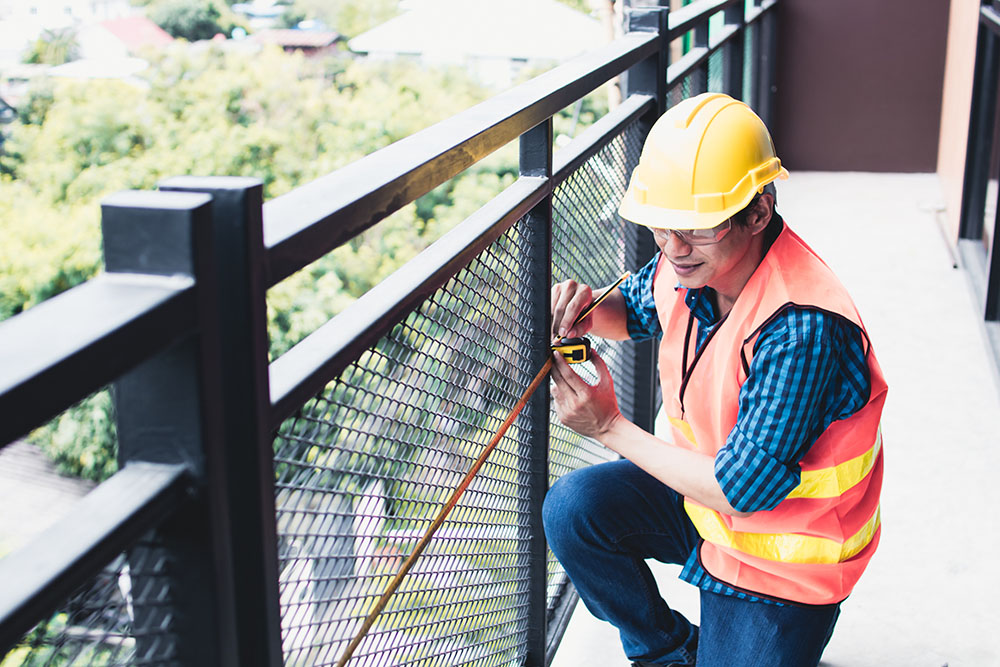
California SB 326: HOA Balcony Inspection Law (Civil Code §5551)
SB 326 requires HOAs/condos in California to complete periodic inspections of Exterior Elevated Elements (balconies, decks, stairs, walkways) by a licensed structural engineer. This guide explains who’s covered, what must be inspected, documentation requirements, deadlines, and how DrBalcony helps you comply.
California Civil Code §5551 Requirements
Senate Bill 326 (SB 326) added Civil Code section 5551 to the Davis-Stirling Act, mandating that condominium associations inspect load-bearing components of exterior elevated elements and their associated waterproofing systems. This law became effective January 1, 2020, with the first inspection deadline of January 1, 2025.
Complete SB 326 / Civil Code §5551 Compliance Guide
- Civil Code §5551 – What is SB 326?
- Condominium Association Requirements
- Exterior Elevated Elements Defined
- January 1, 2025 Deadline & Timeline
- SB 326 vs SB 721 Legal Differences
- Licensed Structural Engineer Requirements
- Professional Inspection Costs
- Board Liability & Legal Risks
- Dry Rot & Waterproofing Systems
- Professional Compliance Services
- Legal FAQs & Civil Code §5551
Following the tragic 2015 Berkeley balcony collapse that killed six people, this legislation ensures the structural safety of balconies, decks, stairs, and walkways in condominium projects. This comprehensive legal guide explains Civil Code §5551 compliance requirements, board liability risks, inspection deadlines, and professional obligations for condominium associations under California law.
Civil Code §5551 (SB 326) Quick Reference
- Legal Authority: California Civil Code Section 5551 (Davis-Stirling Act)
- Mandatory Deadline: January 1, 2025 (first inspection)
- Applies To: Condominium associations with 3+ units only
- Inspector Requirements: Licensed structural engineer or architect
- Re-inspection Cycle: Every 9 years after initial inspection
- Board Liability: Breach of fiduciary duty for non-compliance
California Civil Code §5551: The SB 326 Balcony Bill Explained
California Civil Code section 5551 was added to the Davis-Stirling Act on January 1, 2020, following the passage of Senate Bill 326 in 2019. Governor Newsom signed this legislation after the Berkeley balcony tragedy that highlighted the urgent need for mandatory structural inspections in condominium projects.
Civil Code §5551 specifically applies to condominium associations and requires inspection of load-bearing components of exterior elevated elements that are supported substantially by wood or wood-based products. This law does NOT apply to planned developments – only to condominiums as defined under the Davis-Stirling Act.
Important Legislative Update: AB 2579
Assembly Bill 2579 extended the SB 721 inspection deadline to January 1, 2026 for apartment buildings. However, Civil Code §5551 (SB 326) deadlines remain unchanged – condominium associations must still complete inspections by January 1, 2025.
Board of Directors Liability Under Civil Code §5551
Condominium association boards face significant legal exposure for non-compliance with Civil Code §5551, including:
- Breach of fiduciary duties to association members
- Personal liability for directors and officers
- Negligence claims if structural failures result in injury
- Insurance coverage issues for untimely inspections
- CC&R enforcement lawsuits by members
Condominium Association Requirements Under Civil Code §5551
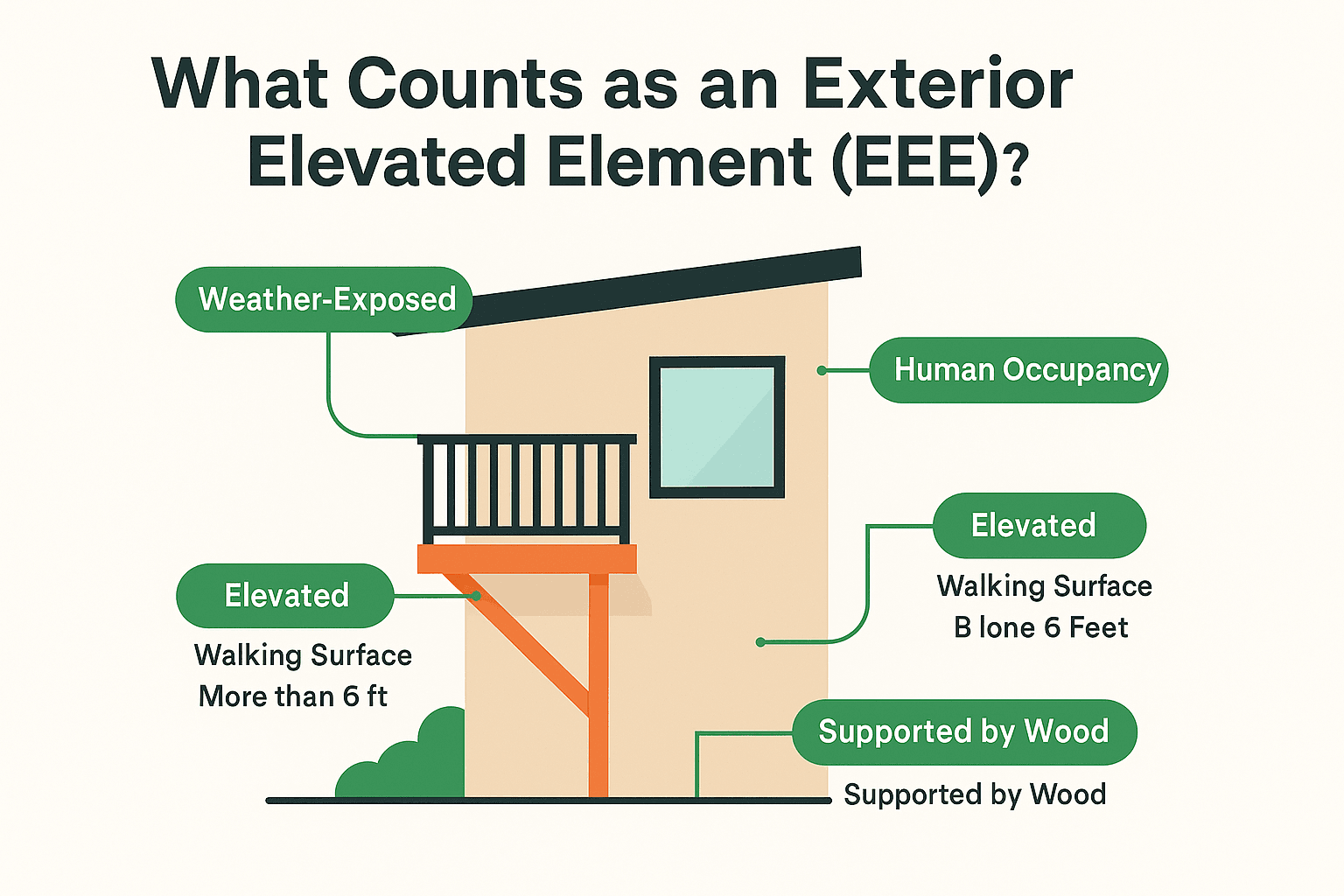
Which Properties Must Comply with SB 326
Civil Code §5551 applies exclusively to condominium projects with three or more dwelling units, including:
- Traditional condominium projects
- Community apartment projects
- Stock cooperatives
- Townhouse condominiums (structure owned in common)
Planned Development Exclusion
Important: SB 326 does NOT apply to planned developments where homeowners own their individual structures. The law specifically targets condominium associations where the association has maintenance obligations for exterior elevated elements.
Townhouse Condominium Considerations
For townhouse developments, the form of ownership determines SB 326 applicability:
- Condominium townhouses: If unit boundaries are defined as unfinished interior surfaces, the structure is common area and SB 326 applies
- Planned development townhouses: If owners have fee simple ownership of structure and lot, SB 326 does not apply
Exterior Elevated Elements (EEEs) Defined by Civil Code §5551
Civil Code §5551 requires inspection of load-bearing components that meet ALL of the following statutory criteria:
Technical Definition of Inspectable EEEs
- Weather-exposed: Located on the exterior (not interior spaces)
- Structurally extending: Extend beyond exterior walls to deliver structural loads
- Elevation requirement: Walking surface more than 6 feet above ground level
- Human occupancy: Designed for human use or occupancy
- Wood construction: Supported wholly or substantially by wood or wood-based products
Examples of Inspectable Exterior Elevated Elements
- Cantilevered balconies: Wood-framed balconies extending from building structure
- Post-supported decks: Balconies supported by wood posts or columns
- Exterior stairways: Wood-framed stairs and landings over 6 feet high
- Elevated walkways: Wood-supported walkways between buildings
- Railings and guardrails: Associated with above elements
Elements NOT Requiring Inspection
- Concrete and steel balconies: Not wood-supported structures
- Structurally-supported balconies: Cannot collapse independently
- Interior elevated elements: Not weather-exposed
- Ground-level elements: Under 6 feet above grade
January 1, 2025 Deadline & Nine-Year Inspection Cycle
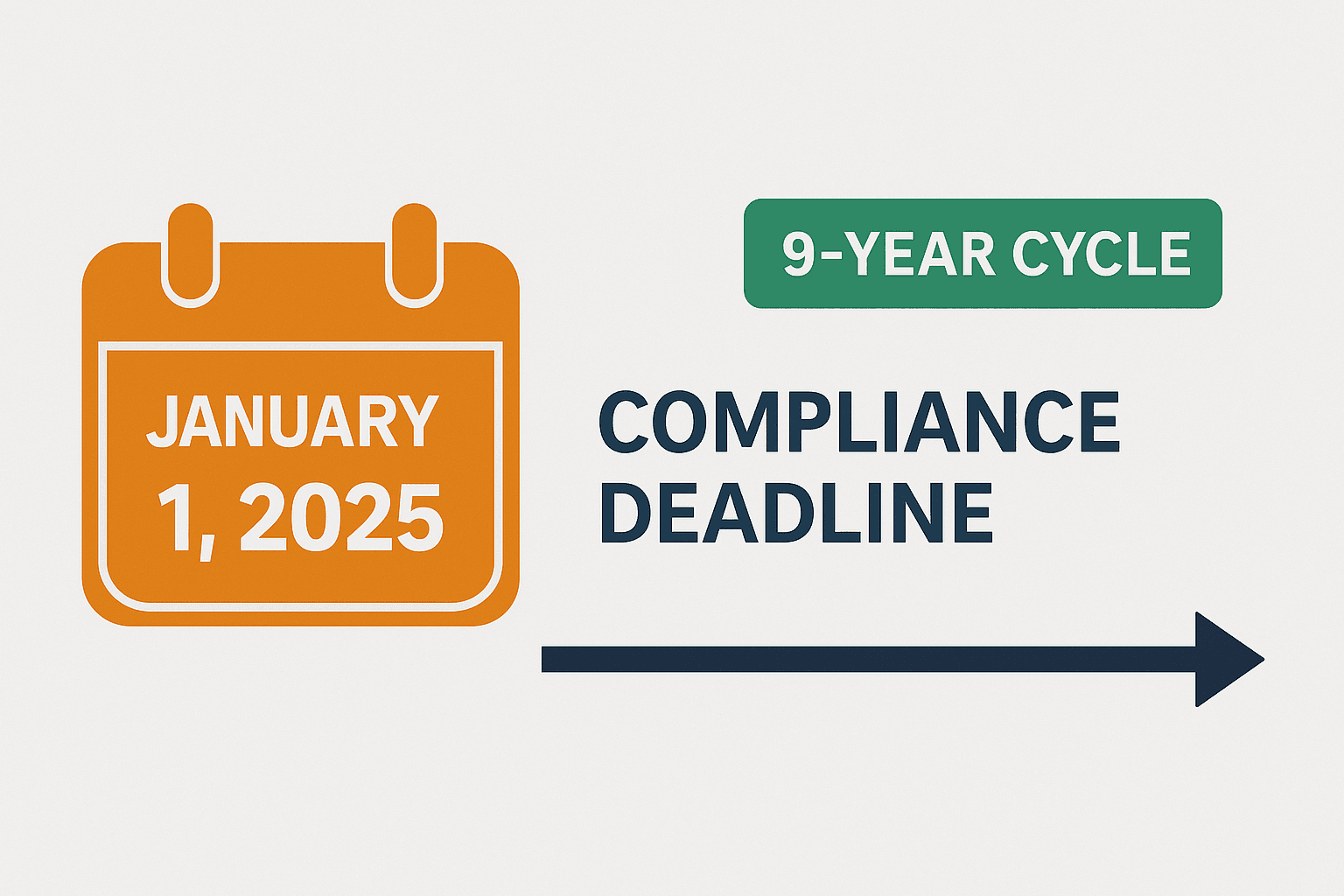
Critical Compliance Deadline: January 1, 2025
All condominium associations subject to Civil Code §5551 must complete their initial exterior elevated element inspection by January 1, 2025. This deadline has not been extended and differs from the SB 721 extension for apartment buildings.
Ongoing Inspection Requirements
After the initial inspection, Civil Code §5551 requires subsequent inspections at least once every nine years. This longer cycle reflects the different ownership structure and maintenance responsibilities in condominium associations compared to rental properties.
New Construction Exception
Condominium projects with certificates of occupancy issued after January 1, 2020, have six years from the certificate date to complete their first inspection.
Emergency Repair Timeline
If inspections identify immediate safety hazards:
- Immediate action required: Association must limit access to affected areas
- 15-day reporting: Inspector must notify local code enforcement within 15 days
- Red-tag compliance: Repairs required before resuming use
- Permit requirements: Most structural repairs require building permits
SB 326 vs SB 721: Legal Differences for Property Owners
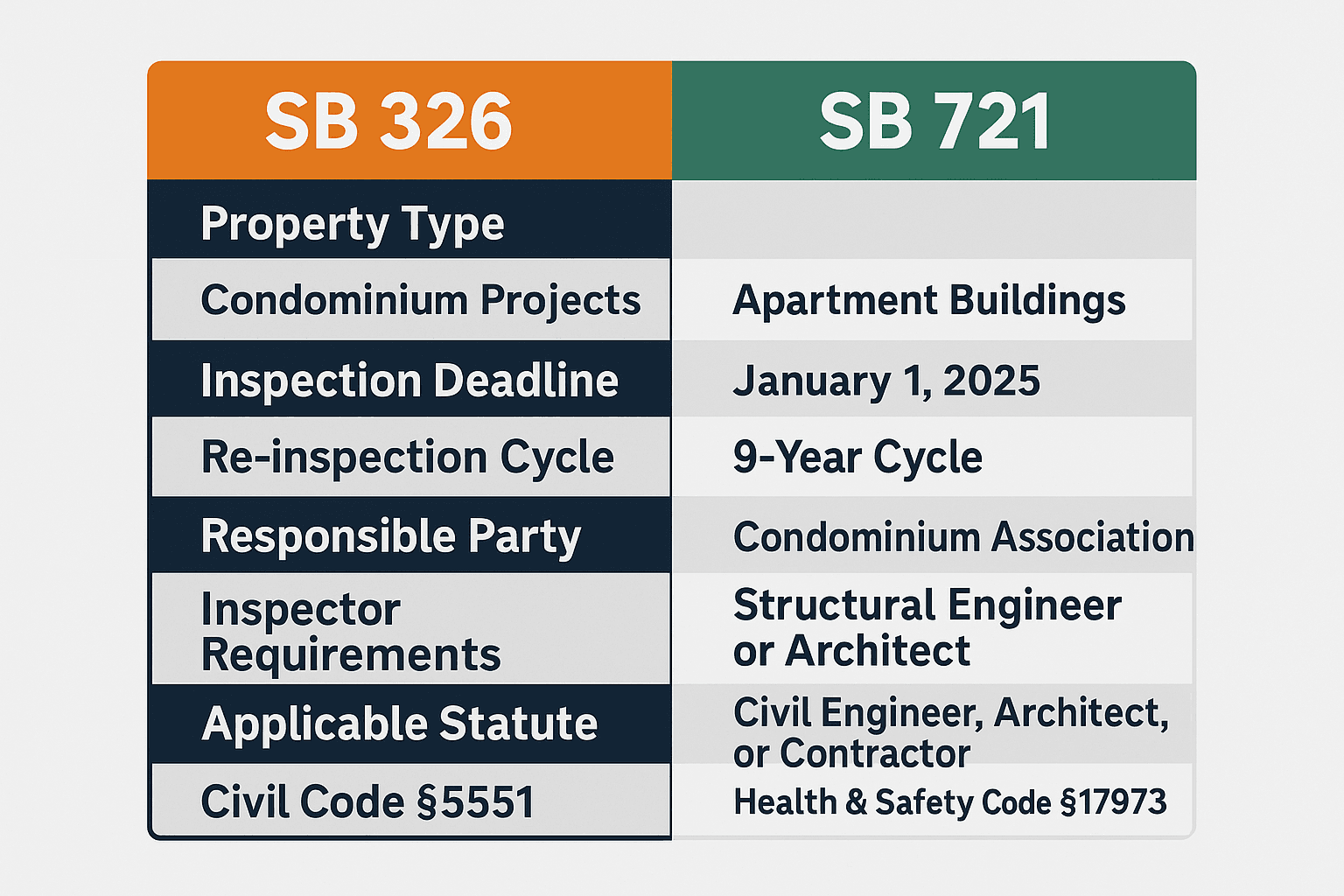
Property owners often confuse SB 326 (Civil Code §5551) with SB 721. These are distinct laws with different requirements, deadlines, and applications:
| Legal Requirement | SB 326 (Civil Code §5551) | SB 721 (Health & Safety Code §17973) |
|---|---|---|
| Property Type | Condominium projects (Davis-Stirling Act) | Apartment buildings (3+ rental units) |
| Legal Authority | Civil Code §5551 | Health & Safety Code §17973 |
| Inspection Deadline | January 1, 2025 | January 1, 2026 (extended by AB 2579) |
| Re-inspection Cycle | Every 9 years | Every 6 years |
| Inspector Requirements | Licensed structural engineer or architect only | SE, architect, or certified building inspector |
| Responsible Party | Condominium association board | Property owner |
Legal Takeaway: If you manage condominiums, you must comply with Civil Code §5551 (SB 326) by January 1, 2025. The AB 2579 extension only applies to apartment buildings under SB 721.
Licensed Structural Engineer and Architect Requirements
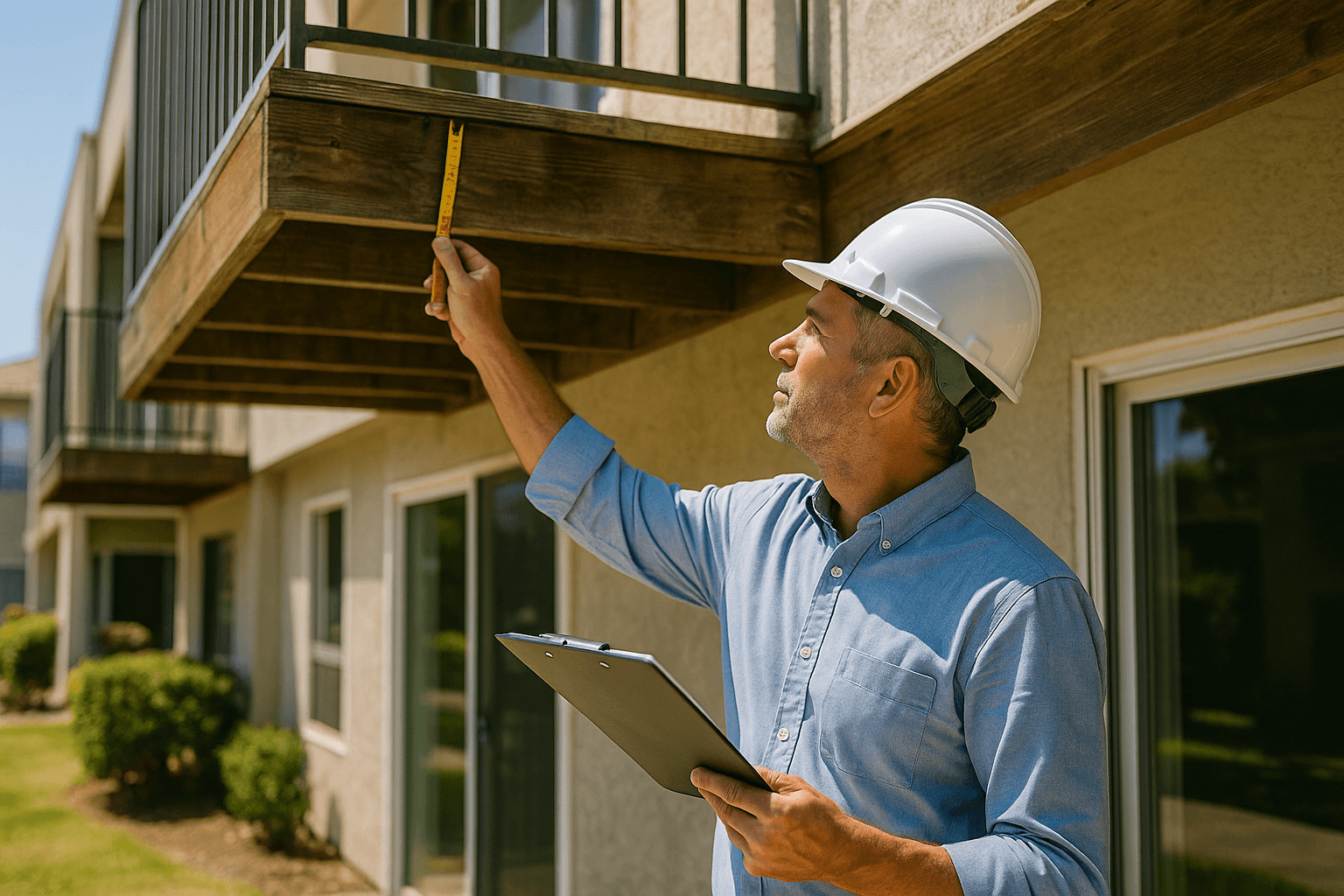
Civil Code §5551 has restrictive professional requirements for condominium inspections, unlike SB 721 which allows additional professional categories.
Required Professional Licenses for SB 326 Compliance
- Licensed Structural Engineers (SE): Must hold current California structural engineering license
- Licensed Architects: Must hold current California architectural license
Professional Licensing Verification
Verify inspector credentials through:
- BPELSG: California Board for Professional Engineers, Land Surveyors, and Geologists
- CAB: California Architects Board
- License status: Ensure current, active license without disciplinary actions
Inspection Methodology Under Civil Code §5551
Licensed professionals must perform:
- Visual observations: Statistically significant sample of EEEs
- Non-intrusive methods: Moisture meters, borescopes, infrared technology
- Professional judgment: Additional investigation as determined necessary
- Safety assessment: Compliance with applicable structural standards
SB 326 Professional Inspection Costs for Condominium Associations
Civil Code §5551 inspection costs vary significantly based on property complexity, number of exterior elevated elements, and professional fees. Budget accordingly for both inspections and potential repairs.
| Condominium Project Size | Typical EEE Count | Inspection Cost Range | Average Professional Fee |
|---|---|---|---|
| Small project (3-10 units) | 5-15 elements | $2,500 – $5,000 | $3,500 |
| Medium project (11-25 units) | 16-40 elements | $5,000 – $12,000 | $8,000 |
| Large project (26-50 units) | 41-80 elements | $12,000 – $25,000 | $18,000 |
| Very large project (50+ units) | 80+ elements | $25,000 – $50,000+ | $35,000 |
Cost Factors for Civil Code §5551 Compliance
- Structural engineer fees: Higher rates for SE vs. architect services
- Property accessibility: Special equipment for difficult-to-reach elements
- Structural complexity: Custom designs require additional analysis time
- Geographic location: Urban markets command higher professional fees
- Market demand: Limited qualified professionals may increase costs
- Invasive testing: Additional costs if destructive testing required
Reserve Study Integration Requirements
Civil Code §5551 requires inspection reports to be incorporated into the association’s reserve study, potentially affecting:
- Reserve fund allocations for structural repairs
- Special assessment planning for major repairs
- Long-term capital improvement budgeting
Board Liability & Legal Risks for Non-Compliance
Condominium association boards face significant legal exposure for failing to comply with Civil Code §5551 requirements. Understanding these risks is crucial for fiduciary duty compliance.
Board of Directors Legal Liability
- Breach of fiduciary duties: Failure to comply with mandatory legal requirements
- Personal liability exposure: Individual director and officer liability
- Negligence claims: Increased risk if structural failures cause injury
- CC&R enforcement: Member lawsuits to compel compliance
- Insurance coverage issues: Potential policy exclusions for untimely inspections
Financial Consequences of Non-Compliance
- Civil penalties: Up to $5,000 per violation
- Daily fines: Ongoing penalties for continued non-compliance
- Legal defense costs: Attorney fees for enforcement actions
- Emergency repair costs: Higher costs for rushed compliance
- Property value impact: Non-compliance affects marketability
Building Department Enforcement Powers
Local code enforcement agencies have authority to:
- Issue notices of violation for Civil Code §5551 non-compliance
- Impose monetary penalties and daily fines
- Require immediate emergency inspections
- Red-tag dangerous exterior elevated elements
- Restrict occupancy until safety issues are resolved
Dry Rot, Fungi, and Waterproofing Systems Under Civil Code §5551
Understanding Dry Rot and Structural Decay
The term “dry rot” is actually a misnomer – wood decay requires moisture to occur. Civil Code §5551 addresses this critical issue by requiring inspection of both structural components AND waterproofing systems.
How Wood Decay Occurs:
- Moisture requirement: Fungal spores need moisture to grow and feed on wood
- Cellulose consumption: Fungi consume cellulose, which gives wood its structural strength
- Progressive weakening: As fungi spread, structural integrity diminishes
- Catastrophic failure: Weakened wood can collapse without warning
Waterproofing System Inspection Requirements
Civil Code §5551 specifically requires inspection of waterproofing systems, including:
- Flashings: Metal barriers preventing water infiltration
- Membranes: Waterproof barriers under walking surfaces
- Coatings: Protective surface treatments
- Sealants: Caulking and joint sealers
- Drainage systems: Proper water runoff mechanisms
Professional Civil Code §5551 Compliance Services
Don’t risk board liability or resident safety. Professional structural engineering services ensure your condominium association meets all Civil Code §5551 requirements and protects your community.
Why Choose Licensed Structural Engineers for SB 326 Compliance?
- Legal compliance: Licensed structural engineers qualified under Civil Code §5551
- Davis-Stirling expertise: Deep understanding of condominium association law
- Proven experience: Thousands of completed California EEE inspections
- Rapid scheduling: Professional inspection services available now
- Comprehensive reporting: Detailed reports meeting legal requirements
- Permit assistance: Support with building permit applications
- Board protection: Professional consultation limiting liability exposure
